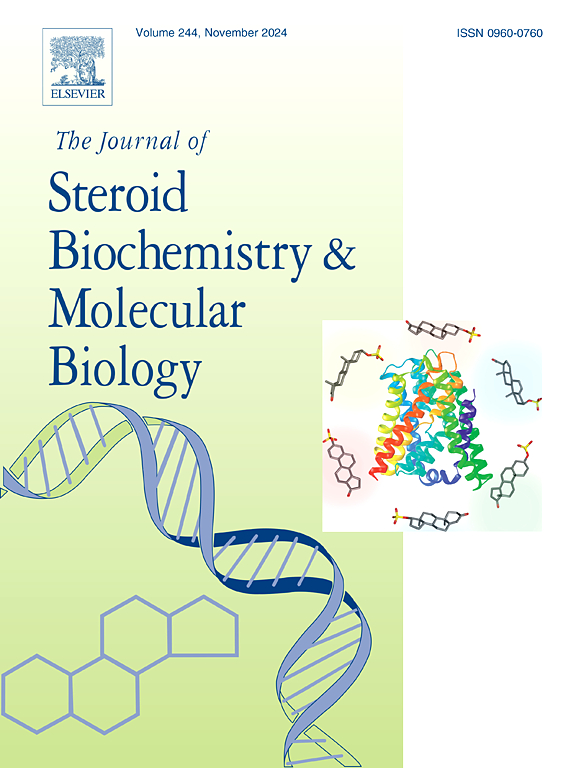维生素D缺乏:COVID-19抗体下降的危险因素?
IF 2.5
2区 生物学
Q3 BIOCHEMISTRY & MOLECULAR BIOLOGY
Journal of Steroid Biochemistry and Molecular Biology
Pub Date : 2025-06-06
DOI:10.1016/j.jsbmb.2025.106809
引用次数: 0
摘要
在COVID-19大流行期间,疫苗接种对于控制SARS-CoV-2的传播至关重要。然而,免疫反应也受到营养和内分泌因素的影响,特别是维生素D,缺乏维生素D与呼吸道感染的风险和严重程度增加有关。本研究旨在通过特异性免疫球蛋白G (IgG)抗体水平评估25-羟基维生素D (25(OH)D)水平对SARS-CoV-2体液免疫反应的影响。还探讨了与其他因素的关系,包括症状、既往疾病、COVID-19病史、疫苗接种状况和感染过程中的药物使用。对来自罗萨里奥别墅(阿根廷)的131名成年患者进行了一项纵向研究,这些患者在2021年8月至12月期间检测出SARS-CoV-2阳性。在诊断时以及诊断后30天和180天收集体重、年龄、身高、性别、症状、既往疾病、维生素D来源和COVID-19病史的数据。85%的患者出现了轻度COVID-19;65 %的人维生素D水平低,有疾病的人25(OH)D水平明显较低。诊断后1个月抗体水平最高。接种疫苗的患者比未接种疫苗的患者表现出更高的特异性抗体水平。那些使用缓和药物控制症状的患者特异性抗体水平较低。最后,维生素D缺乏症患者的抗体水平在诊断后30天至180天之间显著下降。这些发现强调了维持足够的维生素D水平对于持续免疫反应的重要性,并强调了疫苗接种在增强对COVID-19的免疫保护中的作用。本文章由计算机程序翻译,如有差异,请以英文原文为准。
Vitamin D deficiency: A risk factor for antibody decline in COVID-19?
Vaccination was critical in controlling the transmission of SARS-CoV-2 during the COVID-19 pandemic. Nevertheless, immune responses are also influenced by nutritional and endocrine factors, particularly vitamin D, whose deficiency has been linked to an increased risk and severity of respiratory infections. This study aimed to assess the impact of 25-hydroxyvitamin D (25(OH)D) levels on the humoral immune response to SARS-CoV-2, as measured by specific immunoglobulin G (IgG) antibody levels. Associations with other factors were also explored, including symptoms, pre-existing conditions, COVID-19 history, vaccination status, and medication use during the course of infection. A longitudinal study was conducted with 131 adult patients from Villa del Rosario (Argentina) who tested positive for SARS-CoV-2 between August and December 2021. Data on weight, age, height, gender, symptoms, pre-existing conditions, vitamin D sources, and COVID-19 history were collected upon diagnosis, as well as 30 and 180 days post-diagnosis. Eighty-five percent of the patients experienced mild COVID-19; 65 % had low vitamin D levels, and individuals with pre-existing conditions had significantly lower 25(OH)D levels. The highest antibody levels were observed one month after diagnosis. Vaccinated patients exhibited higher specific antibody levels than unvaccinated ones. Those who used palliative medication for symptom control had lower levels of specific antibodies. Finally, antibody levels decreased significantly between day 30 and day 180 post-diagnosis in patients with vitamin D deficiency. These findings emphasize the importance of maintaining adequate vitamin D levels for sustained immune responses, and highlight the role of vaccination in enhancing immune protection against COVID-19.
求助全文
通过发布文献求助,成功后即可免费获取论文全文。
去求助
来源期刊
CiteScore
8.60
自引率
2.40%
发文量
113
审稿时长
46 days
期刊介绍:
The Journal of Steroid Biochemistry and Molecular Biology is devoted to new experimental and theoretical developments in areas related to steroids including vitamin D, lipids and their metabolomics. The Journal publishes a variety of contributions, including original articles, general and focused reviews, and rapid communications (brief articles of particular interest and clear novelty). Selected cutting-edge topics will be addressed in Special Issues managed by Guest Editors. Special Issues will contain both commissioned reviews and original research papers to provide comprehensive coverage of specific topics, and all submissions will undergo rigorous peer-review prior to publication.

 求助内容:
求助内容: 应助结果提醒方式:
应助结果提醒方式:


